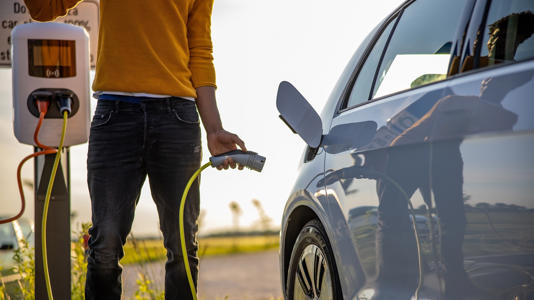How Much Does It Cost To Charge an Electric Car?
Joshua Rodriguez - 5h agoReact
|
77

man charges electric vehicle charging station_iStock-1360553047© SimonSkafar / iStock.com
Electric vehicles, or EVs, are a trending topic. Governments worldwide, including those in the U.S., Norway and China, have created policies to speed the transition from vehicles that burn fossil fuels to EVs.
Read: This Credit Score Mistake Could Be Costing Millions Of Americans
There are obvious environmental benefits associated with driving an electric vehicle. However, for most consumers, the transition is about more than clean energy. The general idea is that charging an electric car is less expensive than filling a gas tank.
The Cost of Charging an Electric Car
No one-size-fits-all answer will explain how much it costs to charge an electric car. Several variables determine the cost. While prices vary by region, type of charger and time of day, it is possible to calculate a general cost using averages of these variables. Here’s how:The Cost of Electricity
One significant variable associated with charging an electric car is the cost of the electricity itself, which can be far more expensive in some regions than in others. As such, EV owners should know the cost of electricity in their area.To calculate the cost, EV owners should grab their most recent electricity bill and look for the cost per kilowatt hour, or kWh. This cost can range from $0.09 to $0.35, but the national average is shy of $0.14.
Electric Car Charging Cost Formula
The formula for the cost of charging an electric car is:Cost to Charge = (CR / RPK) x CPK
- CR is car range
- RPK is range per kWh
- CPK is cost per kWh
Calculating How Much It Costs To Charge Your Electric Car
Related video: Phasing out electric cars can be done, but it’s a challenge
will require all new vehicles sold in the state to be 0 emission
Loaded: 39.88%
Play
Current Time 0:41
/
Duration 4:15
LQ
Captions
Fullscreen
Phasing out electric cars can be done, but it’s a challenge
Unmute
0
View on Watch
Electric vehicles have different ranges, meaning some go further than others on a single charge. The cost per kWh can also vary wildly from one region to the next. However, those are not the only variables to consider when determining the cost of charging an electric vehicle.
Shop 2021 Ford F150 Sport Rack Sale - Racks for Ford F-150 Trucks
Ad
rhrswag.com/ford-f150/truck-racks
Another crucial factor is where the EV owner charges their vehicle and with what equipment. Those who charge their cars at home will pay different rates than those who use a commercial charger. The type of charger also plays a role in cost, which means some people who charge their cars using commercial options will pay different prices than others.
Charging Your Electric Car at Home
Calculating how much it costs to charge an electric vehicle at home is relatively simple. Here are the steps:
- Review your electric bills to determine the cost per kWh.
- Figure out how many miles your EV averages per kWh. EVs typically get about three miles per kWh, but that number can be slightly higher or far lower depending on the vehicle itself.
- Determine the range of your electric vehicle in miles.
- Plug all of these numbers into the formula below.
Cost to Charge = (360 / 3) x $0.14
The math in the formula shows that this particular electric vehicle costs $16.80 to charge at home.
Charging Your Electric Car With a Commercial Charger
It is difficult to determine how much it would cost to charge your car using commercial options because costs vary from one network to the next. The prices will vary even more depending on if the driver is a member of the network they use.
However, the formula above still stands, as long as the drivers know their cost per kWh at the specific network they use. Using the same example above, say the network charges $0.21 per kWh. The formula would look like this:
Cost to Charge = (360 / 3) x $0.21
In this case, it would cost $25.20 to completely charge the EV.
Is It Cheaper To Fill a Gas Tank or Charge an Electric Car?
At the time of writing, the national average for a gallon of gasoline was $3.39, and the average fuel tank capacity on a small vehicle was 12 gallons. Multiplying these two numbers together says the average small vehicle costs about $40.73 to fill up. But that does not tell you the whole story.The example of home charging above also used averages mentioned throughout this article. However, the range of the vehicle in the example was 360 miles, while the average small gas-powered car range is 403 miles. So the cost comparison is somewhat skewed. Since 360 is about 89.33% of 403, it is important to multiply the cost of filling up a gas tank by this percentage to create an apples-to-apples comparison. Using this math, the average car with a 360-mile range would cost about $36.38 to fill up, which is still a bit higher than the average electric vehicle charge cost.
Final Take
Electric vehicles are cheaper to charge than the cost to fill a gas tank. To save money, consider trading in your gas guzzler for an EV.EV Charging FAQ
Here are answers to some of the most common questions about EV charging.- How long do electric vehicle batteries last?
- EV batteries should last 15 to 20 years.
- Do electric cars lose charge when parked?
- Yes. Electric vehicles run on batteries, and batteries typically lose charge when not in use.
- Is it cheaper to charge an EV at night?
- The cheapest time to charge an electric vehicle is between 11 p.m. and 7 a.m.
This article originally appeared on GOBankingRates.com: How Much Does It Cost To Charge an Electric Car?